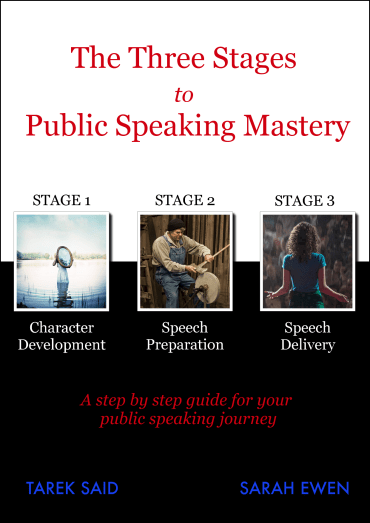TAKE YOUR MASK OFF – HOW TO BE YOURSELF IN PUBLIC SPEAKING
Off stage and out of the spotlight I meet people time and time again oozing with personality, creativity and the ability to captivate others in conversation. However, as soon as these same people are required to stand up and address an audience and “do” public speaking, personality, creativity and the ability to captivate goes out the window. This is replaced with a dry, guarded and robotic like persona on stage.
Why does this happen?
From observing this over the years I think for some speakers adopting a persona and not being truly themselves is their way of avoiding vulnerability, like a safety blanket to protect them.
For other speakers, it is to elevate the pain associated with criticism. If you’re not being yourself, any criticism is like water off a duck’s back as it hurts less because it does not challenge you at the core of your being.
And for other speakers, if they just stick to a formula like they have seen other speakers do, they can just blend in and tick the public speaking box without having to invest any emotional energy into the process. It feels safe and clinical but gets the job done!
The reality is there can be many reasons why a speaker chooses to adopt a persona and yet ironically it is the complete opposite of what the audience want.
The audience want to know you as the speaker, they want to build a rapport and an emotional connection with you so they don’t only hear what your saying but can feel what you’re saying.
For many speakers it feels like a magnetic pull. A pull towards adopting a persona on stage and avoiding being themselves. Here are my tips to prevent you from falling victim to this temptation whenever you step into the spotlight – whether this on stage, in a meeting or at a wedding.
1. Don’t think of public speaking as acting, think of it as a conversation with a friend
When many speakers get on stage they become someone totally opposite to who they really are. Natural extroverts often become subdued, and introverts usually flamboyant. Why? Because they hide behind being someone else. They act!! When we do this we usually want to take the opportunity to be someone different. Being able to be someone else is an important skill when acting in plays and movies but not for public speaking.
In public speaking it is all about being yourself and being natural. In a conversation with a friend we tend to be just that. Open, vulnerable and willing to take all our masks off.
I just want to highlight though we want it to be like a conversation with a friend and not your best friend. Best friends are reserved for sharing our deepest, darkness and often most painful challenges with. On most public speaking occasions this level of sharing is not expected or required and we don’t want to make the audience feel awkward.
Aim in public speaking to be yourself by avoiding thinking of it like acting and more like having a conversation with a friend.
2. Don’t hide behind formalities and language used by royalty, use expressions and vocabulary that reflects you
This one often really amuses me! You can have a one-on-one conversation with someone who uses everyday language and sounds perfectly normal, but as soon as they start public speaking it is like they have swallowed a marble and a dictionary simultaneously.
When they step on stage their voice sounds very different – tone, pitch accent and pronunciation are just some of ways their voice can change making them sound nothing like their own voicemail.
And it does not stop at vocals. More often than not, the language they use changes as well. Phrases like “How do you do” instead of “How are you”? And probably my personal favourite “Without further adieu” instead of simply “next” or “now”.
I am not saying when you get on stage that you should aim to sound unrefined with a potty mouth full of slang. Speaking clearly and using appropriate language for the occasion is vital in public speaking.
What I do want to emphasis is don’t change what you normally sound like or the words you would normal say if you are doing this to hide.
Hiding behind formalities and language is an avoidance tactic. Rather than making it hard for audiences to get past your walls, be yourself and let the audience build genuine rapport with you by sounding like yourself and avoiding formalities if they are not normally you.
3. Don’t be a copycat by trying to be the mirror image of another speaker, learn from others and apply what resonates and works for you
When I am coaching I often have clients tell me ‘I just want to deliver a speech like a Ted Talk I saw on You Tube’. Or ‘I just want to say the same things in the same way my boss does in meetings’. Or ‘I just want to move on stage like the polished speaker I saw at an event’.
Whilst it is great to be inspired by other speakers the goal should be to learn from them and apply what you have learnt if it feels like you and works for you.
The goal should never be to aspire to be exactly like another speaker because by doing this you lose yourself. When you lose yourself you also lose your audience because they find it to very difficult to connect with you or your speech.
The key is to be open and learn what you can from other speakers but in the process not lose yourself.
Public speaking can make you feel vulnerable, exposed and uncomfortable to be yourself. Whilst it can be very tempting to adopt a persona by acting, hide behind formalities and try to copy other speakers, the best thing you can ever do as a public speaker is learn how to take your mask off and be truly comfortable being yourself on stage.
This is when the audience makes a genuine connection with you and it is when the jaw dropping, magical moments on stage happen!

